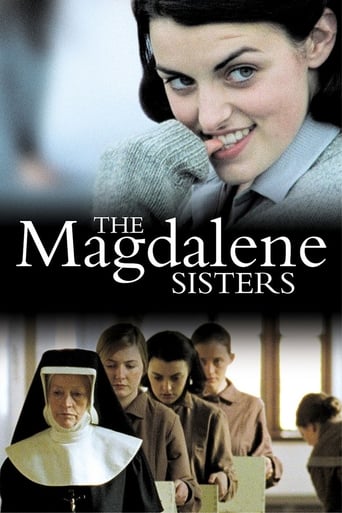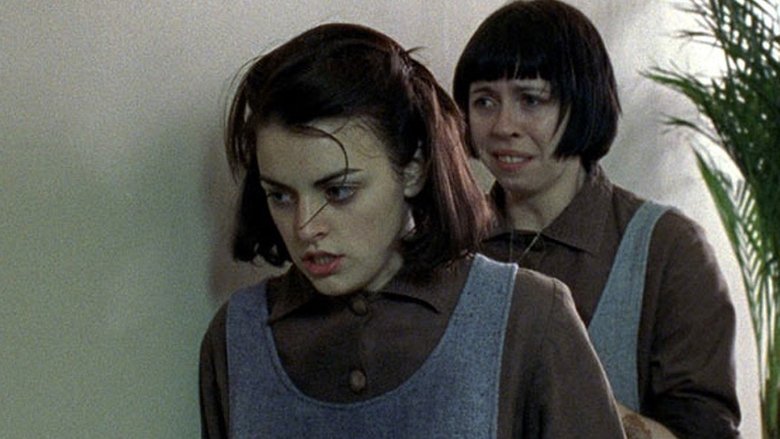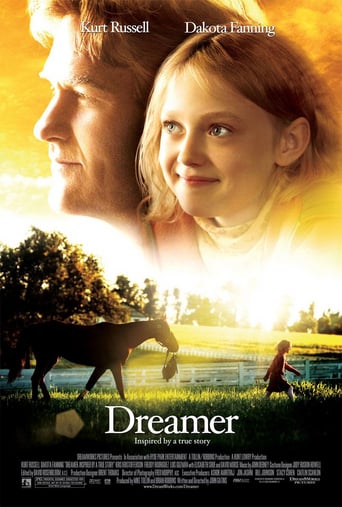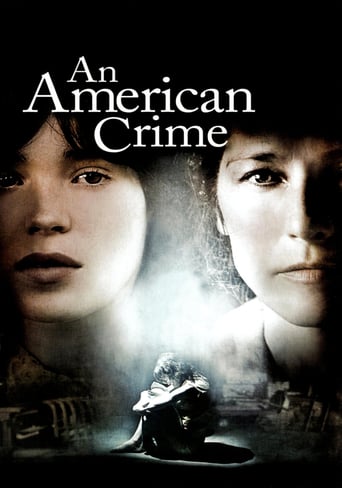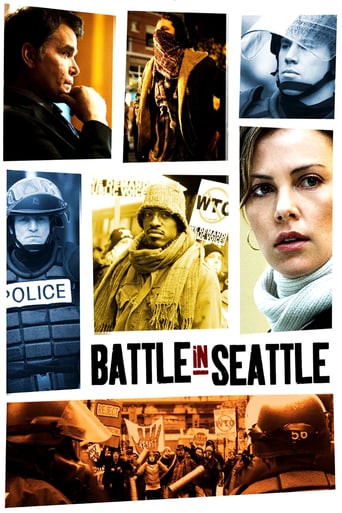The Magdalene Sisters (2003)
Four women are given into the custody of the Magdalene sisterhood asylum to correct their sinful behavior: Crispina and Rose have given birth to a premarital child, Margaret got raped by her cousin and the orphan Bernadette had been repeatedly caught flirting with the boys. All have to work in a laundry under the strict supervision of the nuns, who break their wills through sadistic punishment.
Watch Trailer
Cast


Similar titles
Reviews
Wonderfully offbeat film!
Masterful Cinema
It’s not bad or unwatchable but despite the amplitude of the spectacle, the end result is underwhelming.
There is, somehow, an interesting story here, as well as some good acting. There are also some good scenes
I'm not going to act like a smarta** (like many of the other reviewers) attempting to rationalize the views and beliefs of the 19th century Irish and the influence of Catolicism on the society back then. Instead, I'm going to share my impressions of it, speaking as a casual observer: The first thing that comes to mind is... "What the f***!?" I mean, girls, can you imagine being sent to a place like The Magdalene Sisters for, erm, being pretty, flirting with guys, or being a single mother? No, really - WTF? It seems utterly ridiculous and inconceivable. What about your family disowning you and selling you into slavery if some bastard molested you? I guess if such twisted pseudo-religious extremism was in place today, 95% of today's' women would have to be confined to an asylum.I was quite bothered by the fact that Margaret's family chose to send her off to that awful place (after she was brutally raped by her cousin), instead of calling the rapist to justice and helping their daughter cope with the crime she fell victim to. I don't know what kind of religion condones rape, and, to add insult to injury, considers the *victim* a sinner. I can't imagine how brainwashed and f***ed up people back then must've been. A teenage girl is taken advantage of, yet SHE is the one being punished and getting disowned by her family, while the perpetrator (the rapist) just gets away with it and goes on as if nothing had happened. Where is the logic behind this, and what holy book preaches such "morals"? And Bernadette? She is confined to the asylum merely for the fact that she is moderately attractive and extroverted. This is just totally out of order, seriously.Speaking of Bernadette... she was, obviously, the highlight of the movie. I only wish she would've hit one of the despicable nuns as she and Rose (Patricia) were escaping.I also liked Anne-Marie Duff - the actress has a certain je ne sais quoi.The most tragic of all was certainly Crispina. It was clear from the start that she's not like the other girls - she's already broken beyond repair and her mental health issues are irreversible. It's no surprise that she perished at 24... and of anorexia! How sad indeed...The Magdalene Sisters asylum seemed like a devilish concentration camp rather than a religious organization. I don't think there was ever anything remotely "Godly" about an institution like that. Moreover, real-life survivors have reported that the conditions were actually much worse compared to those portrayed in the movie. Oh, the horror! It's an excellent movie, though. They couldn't have picked a better cast. I can't imagine anyone else playing Bernadette... well, anyone except for Sherilyn Fenn, who has exactly the same dark, sultry look. The other cast members were also chosen perfectly, and though none of them are mega-famous (in fact - most are relatively unknown), the performance surpasses that of well-known Hollywood stars by *miles*.Anyway, I was impressed with the movie, and would not hesitate to recommend it to anyone interested in the subject matter.
Throughout the nineteen fifties and sixties, there were hundreds of institutions throughout America, England and Ireland which indicated centers dedicated to the Christian God. A significant number of these places were later revealed to have been of sanctuaries of corruption and pain. This movie selects one called " The Magdalene Sisters. " Although set in Irland, there are hundreds throughout the world which were run the same way and by the same religious orders. The story originates with writer/Director Peter Mullan who was inspired by a true incident which took place in such an establishment. Four Irish girls are sent to the isolated asylum run by the Magdalene sisters. There they undergo such brutal treatment, ridicule and torturous punishment as a means to curb their unsocial behavior, such as 'looking too pretty.' There is Margaret (Anne Duff) Crispina (Eileen Walsh) Rose (Dorothy Duffy) and Bernaddette (Nora-Jane Noon). All the young girls are constantly mistreated like hapless slaves as they are systematically dehumanized, forced to wash, clean, scrub floors, clothes and endure physical, mental and sexual anguish. Each day, they accept their suffering and silent plight, dreaming of eventual escape. Watching this movie is difficult, but having been exposed to the same brutality, believable in every respect. ****
The Magdalene Sisters chronicles the experiences of three young girls in the infamous Magdalene Laundries. The Laundries were Catholic clergy-run organizations in operation from the 19th century up until the late 20th century in Ireland. Girls were sent to work in these institutions for suspicion of having sex outside of marriage, showing provocative character, or for simply being "too pretty". Mullen succeeds in exposing the outright abuse that went on in these institutions at a time when the Church was seen to be Ireland's highest moral authority.The film focuses on the stories of three "fallen" girls who have all been landed in the Laundries for sins they didn't commit. What is most shocking about this film is the utter sadism and cruelty of the nuns who run the asylum. They force the girls to work beyond endurance in abysmal conditions, and routinely subject them to humiliation of an unthinkable nature. In one scene, the nuns line the naked girls up and judge who is the hairiest, who has the biggest breasts, etc. Mullen wanted the girls to appear natural, and insisted that the they not shave themselves or pluck their eyebrows prior to and during filming. No one is wearing make-up and all the girls wear the same unflattering garb. This adds to the realism of the film and brings his asylum closer to the real Laundries. The clever polarization of character personalities made for some interesting clashes. There is Bernadette, who is fiery and headstrong; Margaret, a responsible girl with a strong sense of morality. Rose, whose good nature endeared me quickly to her. And Crispina, who is just plain bonkers. I found the development of Margaret's character to be particularly interesting: The more oppression she is subjected to, the more she comes to value her independence. This all culminates until her brother finally comes to collect her after four years. Upon realising her newfound freedom, she wont even have her brother tell her to hurry so they can get going: "Don't you dare tell me what to do! Don't you ever dare tell me what to do!"Eileen Walsh was brilliant in this movie. Her portrayal of the simple but eccentric inmate Crispina certainly added a lot of colour to the film. Despite the obviously bleak theme, there are some humorous moments in the film and these usually involve Crispina. This was a very difficult role to take on, as Crispina's theatrical and over-dramatic personality required Walsh to portray such a wide array of emotions. So convincing was Walsh's performance that I found myself feeling real compassion for the girl. She's not all there and is virtually clueless about the world, which makes her fate all the more poignant. Walsh sacrificed vanity more than any of the other girls for this role, which is also to be admired. Her performance stood out for me as one of the highlights of the film.This film should appeal to the secular-minded and those who are critical of religion in general. I don't know if Mullen himself holds any biases in this area, but he certainly succeeds in highlighting just how detrimental an effect fundamentalism can have on a society. It has torn the girls' families apart, stripped them of their independence and, for some of them, has resulted is the considerable deterioration of their mental health. The girls enter the asylum as strong, healthy individuals who, over time, come to forget how to interact properly with other people and find it difficult to distinguish what is real and what isn't. One of the prevailing themes in The Magdalene Sisters is the hypocrisy of devout Christians, who claim to model themselves off of Christ, yet are so un Christ-like in their treatment of the "fallen" in society. This is especially true of the nuns, who are supposed to serve as women of Christ, yet fail to follow in his example of forgiveness and love.One aspect of this movie I found particularly interesting was its depiction how society viewed women in the era. The treatment of the Magdalene girls raises questions about the injustices and double-standards which existed in the early 20th century. Even though the girls of Magdalene are not at fault for being raped, getting pregnant or simply being attractive, it is the women who are punished and ostracised.The crew did a great job of recreating the atmosphere of the old Irish Laundries. Most of the film is shot in dimly lit conditions, to emphasize the bleak and gloomy feel of the place. We get a brief glimpse of the beautiful Irish countryside when Margaret steps outside the grounds of Magdalene and becomes disorientated as she surveys the outside world. She is startled by the light and beauty of freedom, which is in stark contrast to her confinement in the Laundries. Sound is also manipulated to great effect. I really got the feel of an old, spacious dank church as every sound is clearly heard resonating off the stone walls. I think the echo was supposed to simulate that constant feeling of being alone which pervaded the asylum.The shocking nature of this film may prompt the viewer who has had no prior knowledge of the Magdalene asylums to question how accurate a representation it is of the actual Laundries. Indeed, I myself found it hard to accept that the asylums could be this bad until I watched Steve Humphries' 1998 documentary "Sex in a Cold Climate", on which this film is based, and found the reality to be just as harrowing as the adaptation. In fact, one of the inmates told Mullen that the reality of the Laundry was much worse than what is depicted in the film.I really can't recommend this film enough. It was moving, entertaining, and shocking enough to hold my attention until the final credits rolled. Expect to have a seething hatred of Irish nuns instilled in you. 10/10
What struck me about this movie, aside from its moving portrayal of these women and the brutality and humiliation they had to endure, was that it didn't contain a single sympathetic portrayal of the male gender. I wonder if the writer was a misandrist. The closest thing to a decent male character was Margaret's brother, who inquired where she was being taken at the beginning, and rescued her at the end (for which he was unfairly lambasted by her for taking too long to grow up). A close second was the fellow who almost helped Bernadette escape (despite his very crude behavior when first introduced).In terms of being anti-Catholic, it certainly wasn't purely so, as I could discern areas where they tried to show a few of the nuns as having some concern for their charges (in between beatings and humiliations).When I learned that one of the women in the documentary commented that things were much worse than the film portrayed, it made me wonder whether that was simply her perception, or whether it was accurate. I find it hard to believe that all those nuns had been turned into the moral equivalent of Nazi prison guards. What was believable was that the women who endured that treatment were unable afterwards to form harmonious marriages, and some avoided marriage altogether, to avoid letting anyone ever again have that kind of power over them.Anyway, I enjoyed watching first the hour-long documentary, and the next night the film itself. If you're prone to bouts of depression, though, hide the razor blades, and think how far we've advanced since those dark times, not so very long ago.

